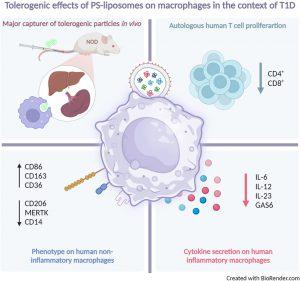Researchers are zeroing in on a potential treatment for type 1 diabetes using liposome-based nanoparticles as immunotherapy. A recent study sheds light on how these nanoparticles interact with immune cells called macrophages, paving the way for future clinical trials (Figure 1).
This autoimmune disease occurs when the body’s immune system mistakenly attacks insulin-producing cells in the pancreas. Currently, managing type 1 diabetes relies on lifelong insulin injections, which doesn’t prevent long-term complications. While newer immunotherapies like teplizumab can delay disease onset, they don’t offer a cure.
This new research focuses on a promising avenue: antigen-specific immunotherapy. The goal is to induce immune tolerance, essentially retraining the immune system to recognize insulin-producing cells as friendly, not foes. The study specifically examines how macrophages respond to this liposome-based immunotherapy.
Macrophages are like the body’s garbage trucks, gobbling up foreign particles, including the liposomes used in this therapy. They then present these particles to other immune system cells, potentially influencing their response. Interestingly, the study found that macrophages are particularly adept at capturing these liposomes compared to other immune cells. This bolsters the potential effectiveness of this approach.
The researchers also discovered that even in individuals with long-standing type 1 diabetes, their macrophages remained fully functional in terms of capturing and processing the therapeutic liposomes. Additionally, the study suggests that macrophages from type 1 diabetes patients can be nudged towards a state that promotes immune tolerance. The therapy appears to alter the macrophages’ phenotype and function without harming them, even at high doses.
These findings provide crucial preclinical data on the mechanism of action for this liposome-based immunotherapy. The study demonstrates the promise of this approach and paves the way for further investigation in clinical trials. This research offers a glimmer of hope for a future where a cure for type 1 diabetes might finally be within reach.
Journal article: Garcia-Loza et al, I., 2024. Targeting macrophages with phosphatidylserine-rich liposomes as a potential antigen-specific immunotherapy for type 1 diabetes, Journal of Autoimmunity.
Summary by Stefan Botha











